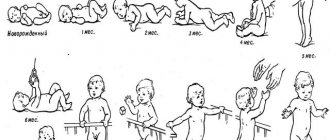Regurgitation - what is it?
Why did the baby start spitting up? In most cases, regurgitation in babies is considered a completely normal physiological phenomenon. According to statistics from pediatricians, 70% of children under six months of age have regurgitated at least once. The whole process occurs as follows: the contents of the stomach are involuntarily thrown into the esophagus, then into the child’s oral cavity, and then naturally everything comes out. Regurgitation occurs “calmly” or in a fountain, and even happens through the nose, and this depends on how much force the walls of the stomach applied to push out food. During this process, the child’s abdominal muscles remain indifferent, i.e. don't strain. Why does a baby burp through his nose? The answer is that the walls of the stomach simply exerted great force to push out formula or breast milk!!!
Regurgitation can also be confused with vomiting. Vomiting can be detected by the contraction of the child's abdominal muscles. This process may also be accompanied by paleness, dizziness, sweating, salivation and attacks of nausea. Bile is also added to the contents of milk and water, so the tint of the vomit becomes yellowish. If your baby is vomiting, you should show it to medical professionals as soon as possible.
Many parents feel like their baby is regurgitating everything he eats. The normal volume is 2 tablespoons. To find out whether the child is spitting up more than normal, you can pour 2 tablespoons of water onto the diaper and compare the spots.
Methods for treating fountain regurgitation in infants
Treatment methods for “fountain” regurgitation depend on the causes that cause it.
- One of the first measures is to support the baby in an upright position for some time before feeding and five to ten minutes after finishing the meal.
- Avoid overfeeding your baby.
- It is recommended not to feed the baby while he is crying.
- When feeding through a nipple, try to keep it airtight.
- Make sure that the baby grasps the areola of the nipple with his lips.
- After eating, try to provide your baby with peace and do not disturb him with active games with pressure on the tummy.
- Avoid tight swaddling and pants with elastic bands (wear bodysuits and overalls instead). Place your baby to sleep on his side or tummy, and place a pillow under his upper body.
- Feed your baby more often. Then he will eat little by little and get full quickly.
- Use special feeding formulas that prevent regurgitation.
- In consultation with the doctor, drug treatment is used, and in special cases, surgery.
Be vigilant and attentive to cases when a newborn spits up like a fountain after feeding! Grow up healthy!
Possible reasons: why a newborn baby often spits up.
There are various reasons for the appearance of regurgitation. Everything can be divided into 2 groups - physiological, not requiring treatment, and pathological, associated with the baby’s illness. The first group includes:
- Swallowing air. This can happen during feeding if the baby takes the nipple incorrectly or the mother gives the bottle incorrectly. Or if during feeding the baby’s head is thrown back to the back.
- Binge eating. If the mother has a lot of milk, the baby may overeat, enjoying the sucking process. In such a situation, the stomach will “remove” excess food through regurgitation, so as not to overload the gastrointestinal tract.
- Overwork. If the baby was overly active while awake, then it is quite possible that regurgitation may occur in the evening after eating.
- Changing the mixture.
- Bloating, colic, dysbacteriosis.
- Teething. With the help of regurgitation, the stomach gets rid of excess saliva formed.
Do you know how to properly attach a baby for feeding and what consequences can happen if you do it incorrectly? Read on this page why a child often hiccups!
How to choose the size of a hat for a newborn baby can be found here?
The second group consists of:
- Lactose intolerance. The baby's stomach does not have the ability to digest milk, which is why frequent and severe regurgitation occurs. The solution to this problem is to select, together with the pediatrician, a suitable lactose-free formula for the child.
- Infection. A child's gastrointestinal tract is the first to react to the appearance of infections, and the regurgitated mass has a yellowish tint. In this case, you need to urgently call a doctor.
- Gastrointestinal pathology. There are a lot of them, and a doctor can determine what exactly is preventing the baby from eating normally.
- Central nervous system disorders that can occur due to hypoxia, prematurity, intrauterine growth retardation, and birth injuries.
Attention!!! It is necessary to distinguish between the causes of regurgitation - this is very important!
Difficulties after feeding (regurgitation)
Babies burp immediately after they eat, or a little later, this is their peculiarity. Only some children do this extremely rarely, while others often. For some babies it’s just belching of air, for others they get rid of some of the milk, and in some cases it ends in vomiting. Let's figure out why this happens and whether it is possible to draw a more or less clear line between normality and pathology.
We are fine! You can be calm about your baby’s well-being if:
- He burps no more than 1-2 times a day;
- The volume of “returned” milk is small;
- There is no vomiting;
- He is gaining weight well;
- He is not tormented by pain in the tummy (except sometimes: almost no one manages to get through the period of colic painlessly);
- He has normal bowel movements (no diarrhea or constipation);
- Finally, he is cheerful and developing well.
What can you do if your baby spits up like a fountain?
Many pediatricians, when asked by parents about what to do when regurgitating, answer that you need to wait until the child is six months old, and everything will go away on its own. But not everyone can just sit and wait 6 months. First, you need to identify the reason why your baby is regurgitating. And then begin to eliminate it.
- Shortly before feeding, it is advisable to place the baby on a flat, hard surface on his tummy and massage him with gentle movements. The child may be capricious at first, but then he will undoubtedly like this procedure. Then you need to try all the options for feeding positions: sitting, lying down, with or without a pillow. The main thing is that both mother and baby feel comfortable.
- When a child eats, you need to make sure that he takes part of the areola and nipple correctly, so as not to swallow air. If the baby is fed formula, then the nipple on the bottle should have a small hole so that the formula does not flow out. You also need to make sure that the entire nipple is filled with food. If the baby is capricious during feeding and periodically lets go of the nipple or pacifier, then it must be placed in a column to get rid of excess air. You should try to put your baby to the breast more often so that he eats often, but in smaller volumes. This will allow him not to be very hungry and not to greedily grab food, including unnecessary air.
- After feeding, you also need to hold the baby in a column for a while, while stroking his back so that excess air escapes. Before burping, the baby may become capricious, because the resulting air brings him discomfort. After burping, he will feel better and the baby will calm down. If the baby is not delighted with this procedure and begins to be capricious and cry, then you should not lift him, otherwise regurgitation will occur due to crying. Then the child must be left alone: do not turn him over, do not swaddle him, do not shake him in your arms.
- You should not swaddle your baby tightly, or use onesies with a tight elastic band; he may burp from squeezing his tummy. The child should only be placed on his side to sleep, his position should be secured with bolsters, otherwise the baby may roll over and choke on vomit.
Why does a child constantly and violently spit up after eating? The answer is simple - don't feed it air!!!
During feeding
- A newborn should eat its quota; there is no need to overfeed, otherwise the excess will come out in the form of regurgitation.
- The position of the baby's body plays a significant role. He should lie comfortably and correctly: the head is not thrown back, the spine is straight, the arms are free, not pressed down, the nose is clean and breathes well.
- It is important that the baby latch onto the breast correctly, otherwise he will swallow excess air and then after eating he will vomit it, and with it the milk he has eaten. The baby should capture not only one nipple, but the entire areola. The mouth should be wide open, the lower lip turned outward. If your baby doesn't take the entire areola, put your finger in his mouth, gently pull out the nipple and try again. Take the nipple with 2-3 fingers, squeeze it a little and put it in the baby's mouth. If the lip is not turned out again, try sticking it out with your finger.
- Continue until your baby latch onto the breast in the correct way. This is significant, because then the peristalsis of the stomach begins to work as it should, the baby sucks out all the milk, it is easy and tasty for him, and the mother is not in pain.
- If your newborn is bottle-fed, use special slow-flow bottles. The nipples in these bottles are designed in such a way as to prevent the swallowing of excess air and the formation of colic. You can buy bottles at a pharmacy or any specialized children's store.
When is it necessary to seek help from doctors?
After reviewing feeding and establishing it, regurgitation stops completely or becomes less frequent. But if the baby does not get better, then the cause of this illness should be sought in gastroenterology or neurology. It is necessary to talk with the pediatrician, tell him in detail when regurgitation occurs, how often, what is the baby’s appetite, how he gains weight and how he behaves throughout the day. Based on the results of the examination, the doctor may write a referral for consultation with a specialist. If your baby was injured during childbirth, it is likely that his regurgitation is due to a neurological problem. A neurologist will help here by examining and prescribing medication for the baby. But with gastrointestinal pathology, surgical intervention may even be necessary. You should also consult a doctor:
- With regular regurgitation more than 2 times a day.
- If there are signs of dehydration: refusal to eat, weakness, low body temperature, drowsiness, frequent or rare urination (the norm is 10-12 times a day).
- If the baby loses or does not gain weight, is restless, sleeps poorly, or is capricious.
- If the vomit has an unpleasant odor, similar to sour milk with a greenish or yellowish tint.
Parents whose baby periodically spits up like a fountain need to carefully monitor the behavior and condition of their child. If he is calm while awake, eats and sleeps well, then you don’t have to worry about his health, but if he is capricious, cries, or loses weight, then this is already a reason for a visit to the doctor. Most often, regurgitation goes away by 4 months, in weak and sick children by 9 months, by this time all processes “ripe” and the functioning of the gastrointestinal tract improves. And parents need to be patient and “outgrow” this difficult period together with their child.
Read when a child begins to hold his head up, this article is especially for you. Read our article about why your baby spits up after every feeding.
What time do teeth cut, read the link
What to do
If your child is regurgitating, you should consult a doctor about this issue. He will be able to assess the degree of this disorder in the newborn and make recommendations. In this case, the specialist can base his assessment on the following criteria.
To assess the intensity of regurgitation, a 5-point rating is used:
- At the same time, a small number of regurgitations (no more than 5 per day), the volume of each of them does not exceed 3 ml, is scored as 1 point;
- The same number of regurgitations, but with a volume of more than 3 ml, is scored 2 points;
- 3 points are given when the number of regurgitations is more than 5 per day, and the volume is less than the amount eaten per feeding;
- The doctor can give 4 points if regurgitation is observed after each feeding, and the volume of regurgitation is small;
- 5 points are given if the volume during regurgitation is almost equal to the amount eaten during one feeding and is observed in more than half of the cases.
It is important to note here that all conditions assessed as 3 points or higher require mandatory consultation with a doctor and treatment.
What does Dr. Komarovsky think about regurgitation in infants?
The process of regurgitation in infants is a natural phenomenon and, as a rule, occurs when the baby overeats mother's milk. But when the volume of regurgitation is very large and parents think that their child has vomited everything he ate, panic begins. And this is quite justified, because there is a high probability that the child has pathologies that can lead to a sharp weight loss, which can lead to dystrophy and other serious diseases.
Children's pediatrician Komarovsky is famous not only in our country, but also abroad. I wonder what he thinks about this and whether parents should panic and take any measures?
The opinion of Dr. Komarovsky!
When the walls of the stomach are stretched, a gag reflex is triggered in newborn children, in which the organ removes everything unnecessary and returns to its previous state. For example, an infant who was put to the breast ate 120 ml of milk, despite the fact that the norm for the stomach is less than 100 ml. A gag reflex arose and he vomited up all the excess in a volume of 40 ml.
Many parents think this is too much and leaves their child hungry. However, if you do the math, it turns out that there are 80 ml left in his stomach. This is normal for an infant, so in this case there is no point in running to the hospital.
Why do newborn babies spit up a lot? It's simple - you don't need to overfeed your baby!!!
You only need to worry if your baby experiences weight loss due to frequent regurgitation. This already indicates neurological, surgical and other pathology. And if the baby is gaining weight according to all the rules and the frequency of regurgitation does not affect his health in any way, there is no need to worry, and even more so, there is no need to shove medications into him, as many people like to do.
If a child spits up in his sleep, it is necessary to ensure that he does not choke. To do this, you need to place a pillow under the mattress so that the baby's body is at an angle of 30 degrees. Or swaddle him tightly and lay him on his side, and put a pillow under his back so that he does not roll over.
Causes
Vomiting in itself is not a pathology; it acts as a consequence of some disorder in the body or is a response to some irritant.
- Failure to maintain hygiene for a nursing woman. If a mother does not control her diet, she does not wash her breasts before feeding.
- Start of introduction of complementary foods. Vomiting may be a reaction to the introduction of a new product or failure to follow the recommendations of proper complementary feeding. Make sure that the baby food has an unexpired expiration date, give portions appropriate for the baby’s age; you should feed the baby only with fresh and high-quality product.
- Reactions to the new mixture. A baby who is accustomed to one type may react negatively to a new product. Perhaps the new mixture contains an ingredient to which the baby’s body reacts in this way.
- Overfeeding. Vomiting in a baby after feeding is essentially regurgitation. This happens due to the lack of space in the stomach to accommodate all the food received, and the excess begins to come back out.
- Poisoning. One of the dangerous causes of vomiting. Occurs after eating poor quality food. As a rule, poisoning is accompanied not only by vomiting, but also by diarrhea. A baby in this condition requires mandatory hospitalization.
- Concussion. If vomiting occurs after the baby falls from any height, you must call an ambulance. However, it is worth considering that this symptom does not always occur immediately after the injury; even a whole week may pass.
- Intestinal infection. If vomiting in an infant is caused by this reason, the baby will need hospital treatment and antibiotics will be required. Diarrhea may accompany vomiting. This condition is fraught with loss of fluid in large volumes. The task of parents is to prevent the onset of dehydration.
- Appendicitis.
- Pyloric stenosis. This pathology is characterized by a narrowing of the passage between the duodenum and the stomach. Refers to a congenital disease. Fountain vomiting in infants is a characteristic symptom of pyloric stenosis.
- Pylorospasm. The essence of this pathology is a narrowing of the pyloric muscles. Due to frequent squeezing, a gag reflex appears.
- Foreign body in the esophagus. Vomiting occurs as a result of compression of the muscles of the esophagus when trying to push out a foreign object.
- Dilatation of the cardiac sphincter of the stomach.
- Neurological abnormalities.
- Intestinal obstruction.
How does excessive regurgitation differ from vomiting?
Very often, parents are unable to distinguish pathology from the norm, mistaking repeated regurgitation in small portions for pathological manifestations. But it is much more difficult to distinguish one pathological condition from another. Thus, in children of the first year of life, vomiting food can be mistaken for regurgitation or vice versa, and these two symptoms indicate completely different diseases.
So, how do you understand that a process is anomalous?
- The child burps frequently and profusely (“fountain”), more than 5 ml at a time.
- Despite the normal portions eaten by the baby, he loses weight.
- Screaming during and after regurgitation.
- The child is older than 1 year, and regurgitation remains his personal “norm”.
- Additional symptoms are noted: upset stomach, unusual color of stool, bad breath.
In order to distinguish regurgitation in infants from vomiting, it is enough to know their characteristic features:
- volume more than 5 ml;
- repeated repetition;
- when vomiting, food has already succumbed to acidic processing in the stomach (milk has curdled, food is partially digested and has a sour smell); when regurgitated, even milk comes out in its original form;
- The general well-being of the child does not change when regurgitating; vomiting usually has “predecessors” - refusal to eat, anxiety, sleep disturbances, bloating.
- regurgitation occurs within the next half hour after feeding and is never a “fountain”.
In general, if a newborn “regurgitates like a fountain,” this is not regurgitation at all, but vomiting. And this is a reason to contact a pediatrician and gastroenterologist.
The baby spits up like a fountain after feeding
Scanty regurgitation after eating is a normal physiological phenomenon for an infant, but if the baby regurgitates profusely, like a fountain, this should alert you.
The cause may be not only a violation of feeding technique, but also anomalies in the structure of the gastrointestinal tract, neurological pathologies. This article is devoted to the causes and prevention of regurgitation in infants; it will teach a nursing mother how to minimize external factors that cause regurgitation, and will help her understand whether it makes sense to see a doctor about this problem.
New parents often start to panic when their newborn spits up like a fountain, especially if it happens repeatedly. Copious, frequent regurgitation can have the same reasons as rare, scanty, internal and external:
Imperfection of the infant's gastrointestinal tract. vertical position of the stomach, short esophagus, weakness of the cardiac sphincter;
Ingestion of a significant volume of air by a child during feeding (aerophagia) due to improper latching of the breast or nipple, poor posture, greedy absorption of food;
Poor quality mixture. A nursing mother's consumption of foods that impair the quality of milk can lead to dyspeptic disorders, with regurgitation being the most harmless of them.
But spitting up like a fountain, especially if it is repeated frequently, may also be a sign of more serious problems that require examination by specialists and correction.
Pathologies of the digestive system - sphincter insufficiency, structural anomalies of the stomach and esophagus, diaphragmatic hernia and upward displacement of the abdominal organs;
If a baby spits up like a fountain, first you need to eliminate possible external causes, improve feeding techniques, and normalize the regimen.
Source









